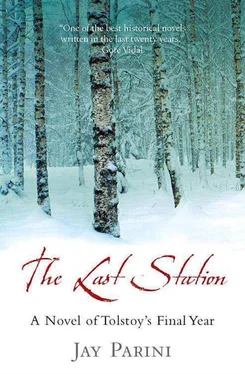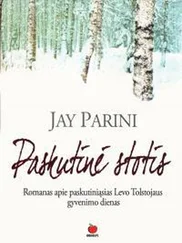‘Come in,’ I said, clearing my throat and sitting up in bed.
She put the tray down on the table beside my bed.
‘It’s very kind of you to bring me tea. You needn’t have done that.’
‘Tomorrow, you will make your own tea,’ she said. ‘But today you may consider yourself lucky.’
Her shyness seemed to evaporate as she cut a fresh slice of lemon and dropped it into the tea.
‘I like being waited on.’
‘We do not grant special privileges around here. Everyone is equal at Telyatinki.’
‘A real democracy!’
‘You’re teasing me.’
‘I’m sorry. Shall I not?’
‘As you will,’ she said. She pushed the blanket back to my knees and sat down. No woman had ever sat beside me while I lay in bed, except my mother. Everything in Masha’s manner proclaimed that she was, by God, a straightforward, progressive, practical girl. A real Tolstoyan.
‘Have you met everyone already? Sergeyenko has no sense of humor. I should warn you,’ she said. ‘He’s extremely kind, however.’
The kindness had eluded me. Sergeyenko, Chertkov’s secretary, is the son of a close friend of Tolstoy. He ran the establishment at Telyatinki in Chertkov’s absence. Unfortunately, I had taken a dislike to him almost immediately upon my arrival the day before. He is a youngish man, plump, in his late thirties; like Chertkov, he has a narrow black beard. There is something a little dandyish about him, except that he takes almost no baths; he smells sour, like rotting wool. He had got straight to business immediately.
‘Vladimir Grigorevich is anxious that you should begin your reports from Yasnaya Polyana,’ he said, having taken me into his bare little study off the front hall. He pulled the mysterious notebooks with the interleaving pages from a burled oak desk. ‘You should know that, for reasons of security, we must keep the existence of these diaries – your diaries – a secret.’
I promised to obey his wishes, but I felt empty inside. Secrecy did not seem, to me, the essence of Tolstoyism. This was no way to begin a relationship with the man I most admire in the world.
‘Did you not like Sergeyenko?’ Masha asked now, interrupting my reverie.
‘He seems sincere,’ I said.
Her small but lovely breasts puffed out her muslin blouse, just a little. Her long arms, slender wrists, and delicate fingers were alluring. I quietly breathed her in, filling my lungs with the soft air that clung to her.
As we talked, I learned that she had taught in St Petersburg. It was unpleasant work – an elite school for the spoiled children of bureaucrats.
‘As a young girl, I wanted to be a nun,’ she said.
I could not restrain a slight grin.
‘You find me amusing?’
‘I’m sorry,’ I said. ‘I can’t imagine you as a nun.’
‘Why?’ She did not seem angry, merely curious.
What could I say? That she was too beautiful to be wasted on a nunnery?
‘You don’t look like a nun,’ I said – a pathetic bridge across an awkward place in the stream of conversation. ‘I mean, nuns are old and… wrinkled.’
She knew I was bluffing and leaped from the bed. ‘I’d better get back to the kitchen. I’m on duty this week. It will be your turn soon enough.’
‘Democracy in action.’
She didn’t like the current of cynicism and turned away.
I wanted to ask her about her interest in Tolstoy, but she seemed in no mood to dwell on herself. She stood, smoothing the folds in her skirt, still uneasy about me.
I thanked her again, a bit profusely, for bringing me the cup of tea.
‘Perhaps one day you’ll bring me a cup,’ she said, closing the door behind her.
It occurred to me that remaining chaste might not be easy at Telyatinki.
I was driven to Yasnaya Polyana by a young farm steward named Andrey. A thin, olive-skinned fellow with tight curls on his head, he has the high cheekbones and slightly upturned eyes of the Mongol. He played the balalaika beautifully on the evening of my arrival, somewhat to Sergeyenko’s dismay. (Sergeyenko thinks that music is frivolous and that readings from Scripture or the philosophers are appropriate evening entertainments.)
‘The count’s a simple man,’ said Andrey, holding the reins. ‘He don’t frighten you. Not like Chertkov.’
‘Does Chertkov scare people?’
Andrey withdrew. ‘He’s all right.’
‘I know what you mean about him,’ I said, trying to reassure him.
We bumped along over the frozen mud. The fog was still thick, hanging in the trees like cotton on a comb. It swirled, pooling in the valley, curling around whitewashed isbas, licking its tail into the corners of Zasyeka Wood. The air had a slight coppery tang.
My stomach was a leather balloon, compressed, hard. I was vaguely nauseated. This was worse than going to school for the first time.
‘Do you know Tolstoy personally?’ I asked.
‘I see him riding in the afternoons, always alone. But he don’t come to Telyatinki much. The countess won’t let him. She’s jealous of his friends, you know. A real bitch.’
‘Countess Tolstoy is a bitch?’
‘I shouldn’t say it, not so blunt.’
‘You should always say what you think.’
I felt like a hypocrite saying such a thing, but – as a person of superior rank – I felt it was my duty to state the obvious moral.
Andrey said, ‘I don’t want to turn you away from the countess. You’ll hear plenty bad enough said about her. Just wait.’
From the first I hadn’t heard a decent word about Countess Tolstoy in the company of Tolstoyans. She seemed like my grandmother, Alexandra Ilinisha, who rode roughshod over my poor grandfather, Sergey Fedorovich. A traditional gentleman of leisure in St Petersburg, he died last year, of apoplexy, at the age of seventy-nine. He had spent the last half century of his life ignoring Grandmother. He walked in the public gardens or hid himself in his study, where he read the latest French and English novels. Wearing a panama hat in summer, with a piqué waistcoat studded with breloques, he was the sort of man Tolstoy would have despised. Yet I liked Grandfather. He was generous and sweet natured, and very learned. He had directed my early reading. In fact, he had led me to Tolstoy, of whom he personally disapproved. ‘He has betrayed his class,’ was Grandfather’s principal criticism, which he couldn’t really explain to me or elaborate. Nevertheless, he was delighted that I had taken to books; any books would do.
‘He’s kind of a simple man,’ said Andrey, again.
‘Who?’
‘Tolstoy! Never raises a voice against nobody.’
A picture of Tolstoy was developing in my head, that of a henpecked, gentle, silent, austere father figure who fends off the world like my grandfather did, somewhat ineptly.
It was nine when we turned into the gates of Yasnaya Polyana. As in a novel, the fog began to lift, revealing the bone-white facade of the manor house in the near distance. The light grew harsh, delineating the wintry scene with a printmaker’s exactness: the tall frozen elm outside the house, the birches to one side of the road, the thatched roofs of various cottages on the estate. Weeds poked through the snow’s recent dusting over the fields, and the estate seemed deserted now, bare but stately and serene.
Andrey deposited me at the front door and departed, leaving me nervously on my own. I took off my hat and gloves and knocked on the heavy door. An elderly man in a dark formal jacket, with white gloves, opened it.
‘You’re the new secretary?’
‘Valentin Fedorovich Bulgakov,’ I said.
He nodded, bowing slightly. He did not volunteer his name, and I didn’t ask. He led me to a cloakroom where I could leave my coat and hat. I had put the letter of introduction from Chertkov in my jacket pocket, and I felt to make sure it was still there.
Читать дальше












